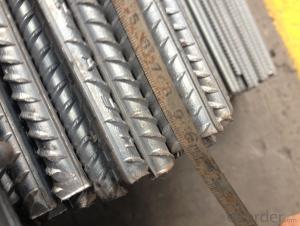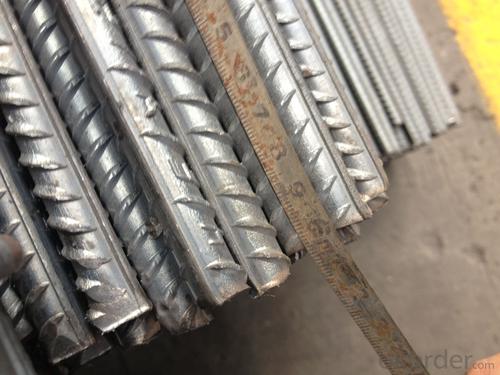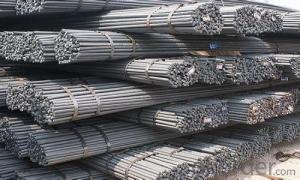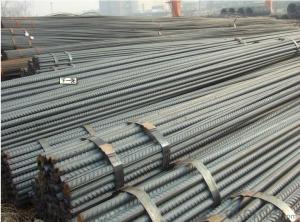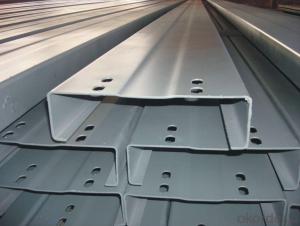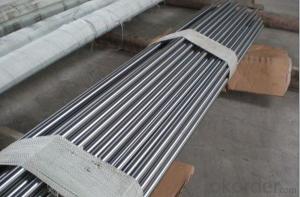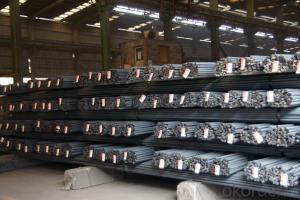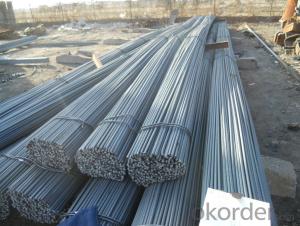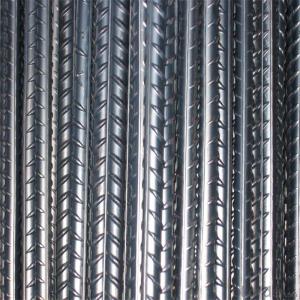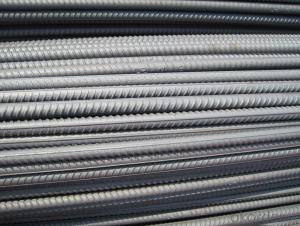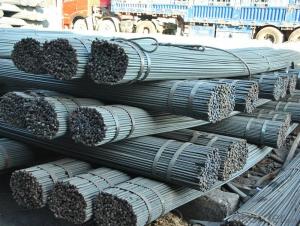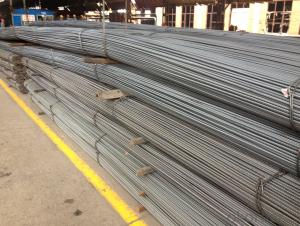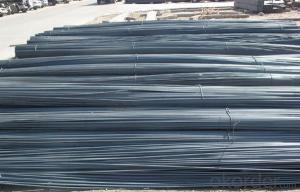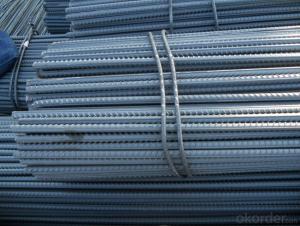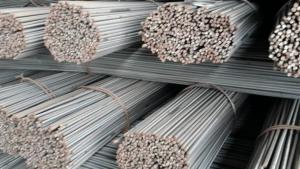High Quality Deformed Steel Bar HRB400 MADE IN CHINA
- Loading Port:
- Lianyungang
- Payment Terms:
- TT OR LC
- Min Order Qty:
- 25 m.t.
- Supply Capability:
- 200000 m.t./month
OKorder Service Pledge
OKorder Financial Service
You Might Also Like
Specifications of Construction High Quality Deformed Steel Bar HRB400 MADE IN CHINA:
Standard | GB UK USA | HRB335 HRB400 HRB500 G460B, B500A, B500B,B500C GR40, GR60 | |
Diameter | 6mm,8mm,10mm,12mm,14mm,16mm,18mm,20mm, 22mm,25mm,28mm,32mm,36mm,40mm,50mm | ||
Length | 6M, 9M,12M or as required | ||
Packing | Export standard packing: wrapped by wire rod in bundles | ||
Each bundle weight | 2-3MT, or as required | ||
Inspection | Accept the third party inspection | ||
Type | Hot rolled steel rebar | ||
Brand name | DRAGON | ||
Chemical Composition: (Please kindly find our chemistry of our material based on BS4449 as below for your information)
BS4449 G460B | Chemical Composition | ||||
C | Mn | Si | S | P | |
0.18 | 0.35 | 0.14 | 0.025 | 0.25 | |
Physical capability | |||||
Yield Strength(N/cm²) | Tensile Strength(N/cm²) | Elongation (%) | |||
625 | ≥460 | 18 | |||
BS4449 500B | Chemical Composition | ||||
C | Mn | Si | S | P | |
0.24 | 0.45 | 0.16 | 0.05 | 0.31 | |
Physical capability | |||||
Yield Strength(N/cm²) | Tensile Strength(N/cm²) | Elongation (%) | |||
650 | ≥500 | 19 | |||
Deformed Steel Rebar in factory
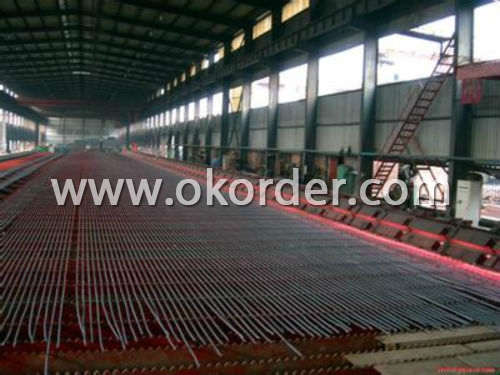
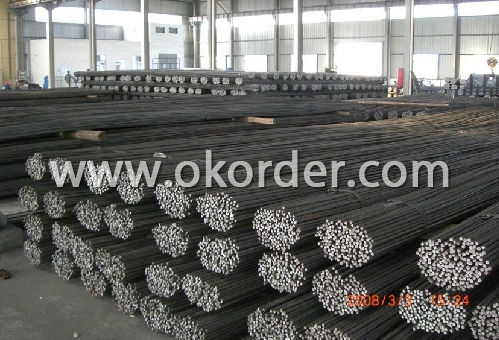
Usage and Applications of High Quality Deformed Steel Bar HRB400 MADE IN CHINA:
Deformed bar is widely used in buildings, bridges, roads and other engineering construction. Big to highways, railways, bridges, culverts, tunnels, public facilities such as flood control, dam, small to housing construction, beam, column, wall and the foundation of the plate, deformed bar is an integral structure material. With the development of world economy and the vigorous development of infrastructure construction, real estate, the demand for deformed bar will be larger and larger..
Packaging & Delivery of High Quality Deformed Steel Bar HRB400 MADE IN CHINA:
Packaging Detail: products are packed in bundle and then shipped by container or bulk vessel, deformed bar is usually naked strapping delivery, when storing, please pay attention to moisture proof. The performance of rust will produce adverse effect.
Payment terms: TT payment in advance or Irrevocable LC at sight.
Trade terms :FOB, CFR, CIF
Delivery Detail: within 45 days after received advanced payment or LC.
Note:
1. Our products are produced according to national standard (GB), if not, supply according to national standards (GB) or agreement as customer required.
2. Other Grade and Standard Deformed Steel Bar we can supply:
Grade: GR40/GR60, G460B/B500A/B500B/B500C,BST500S
Standard: ASTM, BS, DIN
The Minimum Order Quantity of these products is high, and need to be confirmed.
3. We can not only supply Deformed Steel Bar; if you need anything about building materials, please contact us for further information.
4. Please send us your detail specifications when inquire. We will reply to you as soon as possible. We sincerely hope we can establish a long stable business relationship.
- Q: Why do stirrups have thread stirrups and round bars? When are they used?
- Your question is actually related to steel and concrete work of a force of synergy in the reinforced concrete structure, steel usually is in tension, in order to ensure the reinforcement force can be well transferred to concrete, so as not to slip, we put the steel processing into whorl ribbed or other rib the shape, its purpose is to increase the adhesion between steel and concrete. Round steel is usually used in lower grade, smaller diameter reinforced steel, mainly because of its low strength, without adding ribs, round bar and concrete bonding between the relay can ensure that its strength is very good play. Therefore, steel bars are mainly used in places where the force is not large and the calculation of the reinforcement is very small.
- Q: What is the process of joining steel rebars together?
- The process of joining steel rebars together is commonly done through methods such as overlap splicing, mechanical splicing, and welding. In overlap splicing, two rebars are overlapped and tied together using wire or steel straps. Mechanical splicing involves using couplers or threaded connectors to join rebars together. Welding, on the other hand, involves melting the ends of two rebars and fusing them together using heat. Each method has its own advantages and considerations, depending on factors like the structural requirements and project specifications.
- Q: What is the role of steel rebars in preventing cracks in concrete structures?
- Steel rebars play a crucial role in preventing cracks in concrete structures by providing reinforcement and enhancing the overall strength and durability of the concrete. When concrete is poured, it is initially strong in compression but weak in tension. This means that concrete can withstand forces that push or compress it, but it is prone to cracking when subjected to pulling or tension forces. To counteract this weakness, steel rebars are embedded within the concrete. These rebars act as a framework, distributing and absorbing tensile forces that would otherwise cause cracks in the concrete. When the concrete experiences tension, the rebars bear the load and help redistribute the forces, preventing cracks from forming or spreading. The steel rebars also enhance the structural integrity of the concrete by increasing its resistance to bending, shear, and other types of stress. This reinforcement is particularly important in large concrete structures such as buildings, bridges, and dams, as it helps to ensure their stability and longevity. Additionally, steel rebars also play a critical role in preventing cracks in concrete due to temperature changes and shrinkage. Concrete tends to expand and contract with temperature fluctuations, and this can lead to cracking if not properly controlled. Steel rebars help to control these movements by providing restraint and minimizing the potential for cracks. Overall, the presence of steel rebars in concrete structures significantly improves their ability to resist cracking. They reinforce the concrete, enhance its tensile strength, and help distribute and control forces that may cause cracks. By effectively preventing cracks, steel rebars contribute to the long-term durability and safety of concrete structures.
- Q: Are steel rebars resistant to corrosion?
- Yes, steel rebars are resistant to corrosion.
- Q: What are the common applications of steel rebars in construction?
- Steel rebars are commonly used in construction for reinforcement purposes. They are primarily used in reinforced concrete structures such as foundations, beams, columns, and slabs to enhance their structural integrity and strength. Rebars help to resist tension forces, prevent cracking, and improve the overall durability of the concrete.
- Q: What is the difference between plate and steel?
- Disk advantages: thread steel is only 9-12, can be screwed on demand random intercept.
- Q: What are the different types of coating available for steel rebars?
- There are several different types of coatings available for steel rebars, each with its own unique properties and benefits. Some of the most common types of coatings include: 1. Epoxy Coating: Epoxy coating provides excellent corrosion resistance and is commonly used in environments where steel rebars are exposed to moisture or harsh chemicals. It forms a protective barrier that prevents corrosion and extends the lifespan of the rebars. 2. Zinc Coating: Zinc coating, also known as galvanization, is one of the most widely used coatings for steel rebars. It provides excellent corrosion resistance and acts as a sacrificial layer, meaning it corrodes before the steel rebars do. This sacrificial protection helps to prevent rust and extend the life of the rebars. 3. Polyethylene Coating: Polyethylene coating is a type of thermoplastic coating that is commonly used for steel rebars in applications where electrical insulation is required. It provides excellent resistance to moisture, chemicals, and abrasion, making it suitable for use in a variety of environments. 4. Fusion-Bonded Epoxy Coating: Fusion-bonded epoxy coating is a type of coating that is applied to the rebars through a process of heat and pressure. It provides excellent adhesion and corrosion resistance, making it ideal for use in harsh environments such as marine or industrial applications. 5. Powder Coating: Powder coating is a dry finishing process that involves applying a fine powder to the rebars and then curing it in an oven. It provides a durable and protective coating that is resistant to corrosion, chemicals, and UV radiation. Powder coating is available in a wide range of colors, making it a popular choice for decorative applications. These are just a few examples of the different types of coatings available for steel rebars. The choice of coating will depend on the specific requirements of the project, such as the environmental conditions, expected lifespan, and desired performance characteristics.
- Q: How do steel rebars affect the constructability of projects in remote locations?
- The constructability of projects in remote locations heavily relies on steel rebars. These rebars have a significant impact on construction projects in such areas in multiple ways. To begin with, the structural integrity of concrete elements greatly depends on steel rebars. By imparting tensile strength to concrete, rebars ensure that structures can withstand different loads and external forces. This becomes particularly crucial in remote locations where construction materials might be scarce. Steel rebars facilitate the construction of sturdy and long-lasting structures, ensuring their resilience even in harsh environmental conditions. Furthermore, remote locations often lack infrastructure and have limited access to skilled labor. However, steel rebars, with their standardized sizes and shapes, simplify construction processes and make them more efficient to manage. They can be easily transported and assembled on-site, reducing the need for complex and time-consuming construction techniques. This proves particularly advantageous in remote areas where the transportation of heavy construction materials can be arduous and expensive. Additionally, steel rebars enable the construction of taller and larger structures, which is vital in remote locations where land may be scarce. By reinforcing concrete elements, rebars allow for the construction of high-rise buildings or bridges, maximizing the utilization of available space and resources. This is especially pertinent in areas with limited land availability, where vertical construction often proves to be the most viable option. Moreover, steel rebars contribute to the overall safety of construction projects in remote locations. Their ability to reinforce concrete elements ensures that structures can withstand seismic activities or other natural disasters, which may be more frequent in certain remote areas. This enhances the resilience of the built environment, safeguarding both construction workers and the inhabitants of these remote locations. In conclusion, steel rebars play a crucial role in the constructability of projects in remote locations. They provide essential reinforcement to concrete structures, enhance efficiency in construction processes, enable the construction of larger structures, and ensure the safety and durability of the built environment. Their utilization in such areas is indispensable in overcoming the challenges posed by limited resources, difficult accessibility, and harsh environmental conditions.
- Q: Can steel rebars be used in offshore oil and gas platform construction?
- Steel rebars are indeed suitable for use in the construction of offshore oil and gas platforms. They are frequently employed as reinforcements in concrete structures, including offshore platforms. This utilization enhances the concrete's strength and durability, thereby increasing its ability to withstand the challenging conditions present in offshore environments, such as powerful winds, waves, and corrosive saltwater. The incorporation of steel rebars into the construction of offshore platforms guarantees the platform's structural integrity, resulting in a secure and dependable structure for oil and gas extraction activities. Furthermore, steel rebars can be custom-designed and manufactured to conform to specific industry standards and requirements, ensuring their appropriateness for offshore applications.
- Q: Are steel rebars resistant to chemical damage?
- Yes, steel rebars are generally resistant to chemical damage. They are commonly used in construction due to their ability to withstand exposure to various chemicals without significant deterioration or corrosion. However, certain aggressive chemicals or environments can still cause corrosion in steel rebars over time, so appropriate protective measures such as coatings or alloys may be required in these cases.
Send your message to us
High Quality Deformed Steel Bar HRB400 MADE IN CHINA
- Loading Port:
- Lianyungang
- Payment Terms:
- TT OR LC
- Min Order Qty:
- 25 m.t.
- Supply Capability:
- 200000 m.t./month
OKorder Service Pledge
OKorder Financial Service
Similar products
Hot products
Hot Searches
Related keywords
